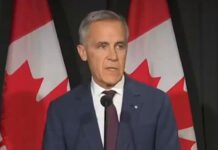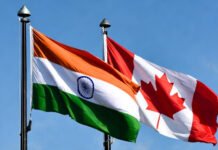INVC NEWS Ottawa – The 2025 Canadian federal elections have brought to light the growing political influence of Indian-origin candidates, with a total of 75 individuals from the community entering the fray to represent their constituencies in the House of Commons. Despite the impressive number of candidates, the election results were a mixed bag, featuring both victories and setbacks for several Indian-origin hopefuls. As the Liberal Party secures a decisive win, the results have sparked a larger conversation about the role of the Indian-Canadian community in shaping Canada’s political future.
Liberal Party’s Victory: Mark Carney’s Continued Leadership
In a major political win, the Liberal Party led by Mark Carney emerged victorious, retaining its power in the federal government. Carney’s leadership, particularly in times of economic recovery, has positioned him as a key figure in Canadian politics. Known for his economic acumen, Carney has played a pivotal role in leading Canada through the 2024 economic downturn, ensuring stability and growth amidst global uncertainties.
Carney’s steady leadership has been instrumental in this victory, marking a turning point for the Liberal Party, which capitalized on his extensive experience in economic governance. The party’s success in this election has solidified Carney’s role as Prime Minister, steering the country’s policy directions with an eye on the future.
Indian-Origin Candidates: Triumphs, Defeats, and Rising Influence
Indian-origin candidates in Canada’s 2025 federal elections made a strong showing, though not without challenges. These candidates represent a wide political spectrum and come from diverse backgrounds, but their shared experience as part of the growing Indian diaspora in Canada adds a layer of significance to the results. The participation of 75 Indian-origin candidates this election reflects an increasing engagement with Canadian politics among immigrant communities.
Anita Anand: A Milestone Victory for the Liberals
Among the most notable successes was the re-election of Anita Anand in Oakville East. Anand, a respected member of the Liberal Party, claimed victory for the third consecutive time, securing her place as one of the most prominent figures in Canadian politics. As the current Minister of Innovation, Science, and Industry, Anand’s tenure has been marked by her focus on fostering technological innovation and economic development across Canada.
Her continued success exemplifies the growing importance of the Indian-Canadian vote, especially in key urban regions. Anand’s victory is a testament to her solid connection with voters and the Liberal Party’s ability to maintain strong support among the diverse Canadian electorate.
Jagmeet Singh: A Major Setback for the NDP Leader
In contrast to Anand’s success, Jagmeet Singh, leader of the New Democratic Party (NDP), faced a stunning defeat in Burnaby South, a seat he had previously held. Singh’s loss comes at a critical time for the NDP, which had high hopes of making substantial gains in this election. Despite his strong advocacy for progressive policies on healthcare, climate change, and social equity, Singh was unable to retain his seat, signaling a shift in the party’s fortunes.
Singh’s defeat, alongside the NDP’s inability to secure more than 12 seats, has had a profound impact on the party’s future. In the wake of the election, Singh announced his resignation as the party leader, citing a loss of support and his failure to retain his seat as the main reasons for stepping down. His departure marks a significant moment in the NDP’s history, leaving questions about the party’s leadership and direction.
Shuv Majumdar: A Major Win for the Conservative Party
While the Liberal Party maintained its hold on power, the Conservative Party also saw notable victories, particularly in Western Canada. One such victory was achieved by Shuv Majumdar, a Conservative Party candidate who triumphed in Calgary Heritage, defeating Liberal Party candidate Scott Arnett by a substantial margin of nearly 20,000 votes.
Majumdar’s victory underscores the strong support for the Conservative Party in Canada’s Western provinces. His success is also a reminder of the increasing political engagement of the South Asian community in Canada, particularly in regions like Calgary, which have seen growing numbers of Indian-origin residents in recent years.
Kamala Khera’s Unexpected Defeat in Brampton West
One of the more surprising outcomes was the loss of Kamala Khera, a Liberal Party candidate in Brampton West, who was defeated by Conservative Party opponent Amarjit Gill. Khera, who had previously made history as one of the youngest female MPs elected to the Canadian House of Commons, was unable to hold onto her seat in this election, marking a setback for the Liberal Party.
Khera’s defeat highlights the unpredictable nature of Canadian elections, especially in suburban areas like Brampton, where the Indian-Canadian vote has become a key factor in determining election outcomes. Despite her early success in Canadian politics, Khera’s loss raises questions about the future political strategies that the Liberal Party may need to adopt in ethnically diverse constituencies.
Preeti Oberai Martin: A Loss for the Liberal Party in Calgary East
Another loss for the Liberal Party came in Calgary East, where Preeti Oberai Martin, the daughter of the first Hindu member of Parliament Deepak Oberai, was defeated by Conservative candidate Jasraj Hollen. Martin’s loss underscores the competitive nature of the political landscape in regions where the Conservative Party has a strong presence.
Despite her significant political heritage, Oberai Martin was unable to overcome the momentum of her Conservative opponent. This outcome serves as a reminder of the challenges faced by candidates from ethnic minority communities in regions that may not always align with their political ideals.
The Future of Indian-Origin Canadians in Politics
While this election revealed the highs and lows of Indian-origin candidates, it is clear that their presence in Canadian politics is only growing. The results indicate a shift toward greater representation of the Indian-Canadian community in federal politics, and their influence will continue to shape the country’s political landscape for years to come.
The number of Indian-origin candidates has steadily increased over the years, reflecting not only the growing population of Indian-Canadians but also their increasing engagement in political matters. As the community continues to expand, the involvement of Indian-origin individuals in Canadian politics is likely to deepen, with more candidates vying for leadership positions and playing a larger role in decision-making.
Conclusion: A Milestone Moment for Canadian Politics
The 2025 Canadian federal elections have marked a significant moment in the country’s political history. The Liberal Party’s victory, the resignation of Jagmeet Singh, and the varied successes and setbacks of Indian-origin candidates paint a picture of a changing political landscape. The election results reflect the evolving dynamics of Canadian democracy, where the political contributions of immigrant communities, particularly the Indian diaspora, continue to gain importance.
As Canada moves forward, the growing political influence of Indian-origin Canadians will undoubtedly shape the nation’s political decisions, from economic policies to social reforms. The next election will likely see even more Indian-origin candidates entering the race, further cementing the community’s place in the political fabric of Canada.
















